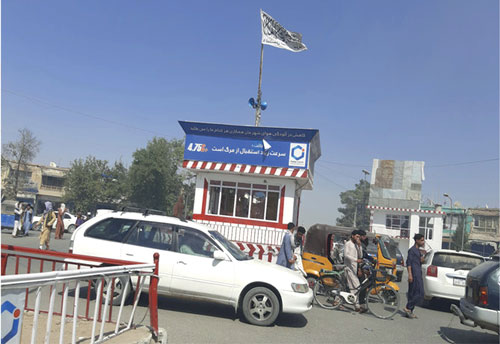Tighten noose over countryside; Air Force pilot killed in Kabul explosion
Kunduz
The Taliban tightened the noose around northern Afghanistan Sunday, capturing three more provincial capitals as they take their fight to the cities after seizing much of the countryside in recent months.
The insurgents have snatched up five provincial capitals in Afghanistan since Friday in a lightning offensive that appears to have overwhelmed government forces.
Kunduz, Sar-e-Pul and Taloqan in the north fell within hours of each other Sunday, lawmakers, security sources and residents in the cities confirmed. In Kunduz, one resident described the city as being enveloped in “total chaos.”
“After some fierce fighting, the mujahideen, with the grace of God, captured the capital of Kunduz,” the Taliban said in a statement Sunday afternoon.
“The mujahideen also captured Sar-e-Pul city, the government buildings and all the installations there.” The insurgents said on Twitter on Sunday evening that they had also taken Taloqan, the capital of Takhar province.
Parwina Azimi, a women’s rights activist in Sar-e-Pul, told AFP by phone that government officials and the remaining forces had retreated to an army barracks about three kilometers (two miles) from the city.
The Taliban had the compound “surrounded,” said Mohammad Hussein Mujahidzada, a member of the provincial council.
Taloqan was the next to go Sunday, with resident Zabihullah Hamidi telling AFP by phone that he saw security forces and officials leave the city in a convoy of vehicles.
“We retreated from the city this afternoon, after the government failed to send help,” a security source told AFP. “The city is unfortunately fully in Taliban hands.”
Kunduz is the most significant Taliban gain since the insurgents launched an offensive in May as foreign forces began the final stages of their withdrawal.
The ministry of defense said government forces were fighting to retake key installations. “The commando forces have launched a clearing operation.
Some areas, including the national radio and TV buildings, have been cleared of the terrorist Taliban,” it said.
Spokesman Mirwais Stanikzai said later that reinforcements including special forces had been deployed to Sar-e-Pul and Sheberghan.
“The capture of Kunduz is quite significant because it will free up a large number of Taliban forces who might then be mobilized in other parts of the north,” said Ibraheem Thurial, a consultant for International Crisis Group.
Vivid footage of the fighting was posted on social media over the weekend, including what appeared to be large numbers of prisoners being freed from jails in captured cities.
“US forces have conducted several air strikes in defense of our Afghan partners in recent days,” Major Nicole Ferrara, a Central Command spokesperson, told AFP in Washington.
Hundreds of thousands of Afghans have been displaced by the recent fighting, and on Saturday, 12 people were killed when their bus was struck by a roadside bomb as they tried to flee Gardez in Paktia province.
The withdrawal of foreign forces is due to finish at the end of this month ahead of the 20th anniversary of the September 11 attacks. The US-led invasion sparked by 9/11 toppled the first Taliban regime in 2001.
An Afghan security forces spokesman said “extremely (heavy) fighting is going on” in Kunduz, as security forces fought to defend the city, regarded as a strategic prize as it lay at the gateway to mineral-rich northern provinces and Central Asia.
Taliban spokesman Zabihullah Mujahid said the group had largely captured the province and were close to the airport. In Sar-e-Pul, Rahmani said: “Government headquarters, including the governor’s house, police command, and the National Directorate of Security compound, are captured by the Taliban.”
Meanwhile, an Afghan Air Force pilot was killed by a bomb in Kabul on Saturday, officials said, in an attack claimed by the Taliban.
The pilot, Hamidullah Azimi, died when a sticky bomb attached to his vehicle detonated, officials said, adding that five civilians were wounded in the explosion.
Azimi was trained to fly US-made UH60 Black Hawk helicopters and had served with the Afghan Air Force for almost four years, the force’s commander, Abdul Fatah Eshaqzai, told Reuters.








